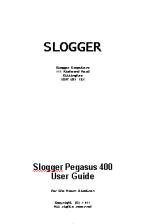
Electron User
 1st January 1989
1st January 1989
Categories: Review: Peripheral
Author: Roland Waddilove
Publisher: Slogger
Machine: Acorn Electron
Published in Electron User 6.04
Roland Waddilove puts a new disc interface through its paces
Pegasus 400: Driving Hardware
The Pegasus 400, from that well-known supplier of quality add-ons Slogger, is a new disc interface for the Electron. During the past three years, well over half a dozen disc filing systems in various interfaces have appeared - and some have now disappeared too. So what has Pegasus got to offer that hasn't been seen before?
The strongly constructed Acorn cream interface is in the form of a large cartridge that plugs into the Plus 1 or Rombox Plus. To make use of it you'll also need to buy either a 5.25" or 3.5" disc drive with a built-in power supply.
The interface contains an E00 1770 DFS, which means that it is compatible with the BBC Micro's disc filing system. So you can pop a BBC Micro disc in and read it without any problems (though actually running BBC Micro programs is an entirely different kettle of fish).
Also PAGE is kept firmly at &E00, so you don't lose any of your valuable ram when you upgrade to discs. Compare this to the Plus 3's ADFS which rather greedily demands 3.5K of workspace for its own exclusive use. The upshot is that you won't experience any difficulty running long tape-based programs that you have transferred to disc.
Functions And Utilities
Present are all the standard DFS functions and utilities for formatting discs, renaming, locking, wiping, destroying and deleting files, selecting the drive, directory and library, and copying files or discs. The figure below shows the full command list.
An unusual addition is TYPEAHEAD, a command unique to Pegasus. Normally, when the Electron accesses the disc drive, it switches off all interrupts, so anything typed at the keyboard is ignored, which can, at times, be a frustrating waste of time. However, this command enables interrupts providing you have fitted a Slogger Turbo Driver or Master RAM Board and you can type away while the disc is being accessed.
Another nice addition to the range of commands is MCOPY, which is like the normal COPY command except that it copies as many files as it can fit in memory, rather than one file at a time. This is most useful for single drive owners, as it cuts down disc swaps to a bare minimum.
RUNPROT is used in conjunction with T2PEG4 - the tape-to-disc transfer utility. It runs a transferred program straight from disc with the advantage of not requiring any ram for its workspace (T2PEG4 needs 256 bytes).
STAT is another name for the more familiar FREE which tells you how much of the disc has been used and how much space is left.
The usual DFS tools are all present and correct - BUILD, DISC, FORMAT, LIST, TYPE and VERIFY. An addition to this list is FDCSTAT, which returns the error of the last disc operation if something went wrong.
The table below shows how the performance of the Pegasus 400 compares to its rivals the AP4 and AP3/Plus 3. The benchtests reveal that there's little difference between it and the AP4, but both offer significant speed improvements over the AP3/Plus 3.
The reason, of course, lies in the filing systems. The AP3/Plus 3 uses the Advanced Disc Filing System (ADFS) whereas the Pegasus and AP4 are DFS. Where the ADFS scores is in storage space, offering over half as much again per disc.
The Pegasus manual is excellent, being large, well-written, full of technical information containing many useful examples and everything is clearly explained. It takes you right from first principles up to the OSWORD &7F calls for directly accessing the disc controller. It is a model for others to emulate.
Conclusion
Slogger's Pegasus 400 is very similar to Pres' AP4 in many ways, and there is little to choose between them. The AP4 is fractionally smaller and 5 cheaper, but the Pegasus has a couple of extra useful, though not essential, commands.
The DFS Tools
Slogger PEGASUS 400 1.01
BUILD <fsp>
DISC
DUMP <fsp>
FORMAT (<drv>)
FDCSTAT
LIST <fsp>
TYPE <fsp>
VERIFY (<drv>)
OS 1.00
Disc Filing System Bench Tests
| Bench Test | Pegasus DFS | AP4 DFS | Plus 3 ADFS |
| 1. SAVE 16K | 4.72 | 3.40 | 3.41 |
| 2. LOAD 16K | 3.6 | 3.52 | 2.65 |
| 3. OPENIN x 1000 | 7.07 | 9.51 | 31.38 |
| 4. OPENOUT x 1000 | 21.93 | 21.71 | 6.49 |
| 5. PRINT# 1000 numbers | 10.28 | 10.42 | 15.43 |
| 6. PRINT# 100 strings | 3.44 | 3.98 | 6.28 |
| 7. INPUT# 1000 numbers | 6.31 | 9.73 | 9.43 |
| 8. INPUT# 100 strings | 2.88 | 3.51 | 3.40 |
| 9. BPUT# 1000 bytes | 4.59 | 4.51 | 6.43 |
| 10. BGET# 1000 bytes | 3.49 | 3.89 | 4.26 |
| 11. Move PTR# forward x 1000 | 3.86 | 3.38 | 7.55 |
| 12. Move PTR# backward x 1000 | 3.67 | 3.42 | 7.64 |
The Pegasus DFS Command List
Slogger PEGASUS 400 1.01
ACCESS <afsp> (L)
BACKUP <src drv> <dest drv>
COMPACT (<drv>)
COPY <src drv> <dest drv> <afsp>
DELETE <fsp>
DESTROY <afsp>
DIR (<dir>)
DRIVE (<drv>)
ENABLE
INFO <afsp>
LIB (<dir>)
MAP (<drv>)
MCOPY <src drv> <dest drv>
RENAME <old fsp> <new fsp>
RUNPROT <fsp>
STAT (<drv>)
TITLE <title>
TYPEAHEAD <argument>
WIPE <afsp>
OS 1.00


